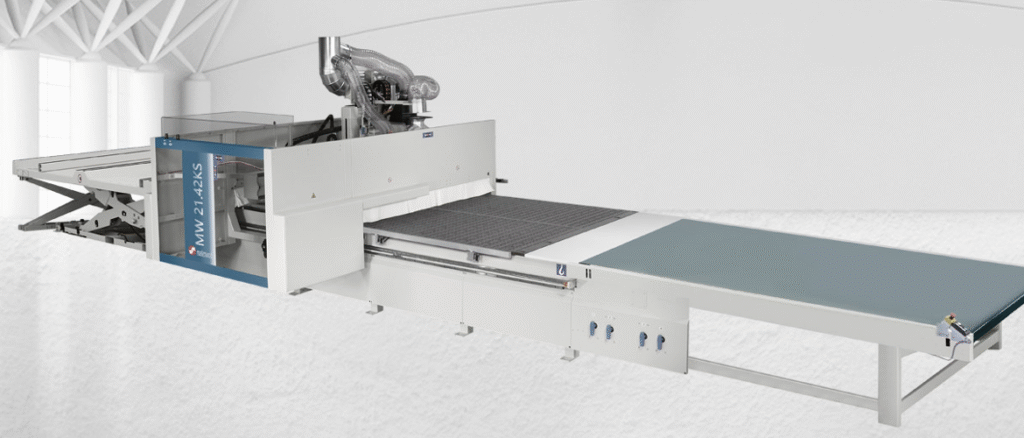The woodworking industry in Australia is changing fast. Many workshops that once relied on manual tools are now shifting to CNC machines. These computer-controlled systems help woodworkers create precise, repeatable cuts with less time and effort.
As you know, running a woodworking shop means finding ways to boost speed and accuracy while keeping costs low. That’s where CNC machines come in. They cut, drill, and shape timber with accuracy that manual tools can’t match.
Also, Australian workshops are facing growing demand for custom furniture and joinery. CNC machines make it easier to handle these complex designs while maintaining a high level of detail and finish.
In this article, we explain how CNC machines are transforming woodworking across Australia from boosting productivity to opening new business opportunities for cabinetmakers, furniture producers, and joinery specialists.
What Are CNC Machines and How They Work in Woodworking
CNC stands for Computer Numerical Control. In simple terms, it means a computer directs the cutting tools instead of manual control. For woodworking, CNC machines handle everything from routing and drilling to shaping and engraving timber.
These machines follow digital instructions created in CAD (Computer-Aided Design) or CAM (Computer-Aided Manufacturing) software. Once the design is set, the CNC machine reads the file and performs each task with perfect accuracy.
Unlike manual tools, CNC machines don’t rely on human precision. Every movement of the spindle, bit, and cutter is calculated to the millimeter. As a result, woodworkers can repeat the same design hundreds of times with consistent results.
Also, most modern CNC woodworking machines come with features like automatic tool changers, vacuum tables, and touchscreen interfaces. This makes setup faster and reduces operator fatigue during long production runs.
As you know, traditional woodworking required skill and steady hands. CNC machines don’t replace craftsmanship they enhance it. They let woodworkers focus on creativity and design while the machine handles the heavy, repetitive tasks.
Why Australian Woodworking Workshops Are Adopting CNC Machines
Across Australia, more woodworking workshops are turning to CNC machines to stay competitive. The main reason is simple these machines help produce more work in less time while keeping quality consistent.
Speed and efficiency are big advantages. A CNC machine can cut complex panels or cabinet parts in minutes. What once took hours by hand can now be done in a single setup. This allows workshops to take on larger orders without hiring more staff.
Also, CNC machines deliver unmatched accuracy and precision. Even small joinery shops can now achieve tight tolerances once possible only in large factories. This means fewer mistakes, less waste, and smoother assembly.
Another reason is flexibility. Many Australian clients now want custom designs or one-off pieces. CNC machines make it easy to switch between projects, from kitchen cabinetry to decorative wall panels, without long changeovers.
As you know, Australia’s woodworking market demands local reliability. Suppliers such as Tuckwell Machinery make CNC adoption easier by offering installation, training, and after-sales support. Workshops no longer have to rely on overseas technicians everything can be handled locally.
In short, CNC machines give Australian workshops the balance of speed, precision, and flexibility they need to meet rising demand while maintaining profit margins.
Supporting Evidence & Trends in Australia
The shift toward CNC machines in Australia isn’t just a passing trend it’s a clear move toward smarter and more automated production. Many woodworking workshops are already seeing strong results after adopting CNC technology.
Recent market insights show that automation and digital control are now top priorities for furniture and joinery manufacturers. Workshops that once relied on manual saws and routers are upgrading to CNC routers and nesting machines to boost efficiency and stay competitive.
Also, local suppliers are expanding their product lines to meet this demand. Companies such as Tuckwell Machinery and Woodtron offer CNC machines tailored to Australian workshop needs. These include heavy-duty frames, powerful spindles, and vacuum systems designed for continuous operation in busy environments.
Another growing trend is software integration. More workshops are connecting CNC machines to design programs like Cabinet Vision and Mozaik. This allows them to move directly from design to production with little manual input, cutting down on time and errors.
As you know, Australian workshops are under pressure to improve both speed and accuracy while managing rising material costs. CNC machines solve these challenges by reducing waste, improving yield, and allowing even small workshops to take on large-scale or custom work.
These trends confirm one thing CNC technology is no longer just for large manufacturers. It’s becoming standard equipment for woodworking businesses of every size in Australia.
Key Features to Look for When Choosing CNC Machines
Selecting the right CNC machine can make a big difference in a workshop’s output, accuracy, and long-term performance. While many options are available in Australia, a few key features stand out when choosing the right one for woodworking.
First, look for a strong and stable machine frame. A solid base reduces vibration, which improves cutting precision and finish quality. In Australia’s demanding workshop environments, a heavy-duty structure ensures consistent performance during long production runs.
Second, focus on spindle power and speed. A higher-powered spindle allows clean cuts through hardwoods and composite materials. For most woodworking jobs, a spindle between 9kW and 12kW offers a reliable balance of strength and efficiency.
Also, a vacuum hold-down table is essential. It keeps panels and boards steady during cutting, which is critical for accurate nesting and shaping. This feature also reduces the need for manual clamping, saving setup time.
Next, consider software compatibility. The best CNC machines work smoothly with popular Australian programs such as Cabinet Vision, Mozaik, and AutoCAD. This ensures easy file transfer and seamless production from design to cutting.
As you know, buying a CNC machine is not just about hardware. After-sales service and local support are equally important. Reliable suppliers like Tuckwell Machinery offer installation, training, and ongoing maintenance a major advantage for Australian workshops that can’t afford long downtime.
In short, the right CNC machine combines power, precision, and local support to keep production running smoothly and deliver consistent results every time.
Overcoming Common Challenges in CNC Adoption
Adopting CNC machines is a smart move for woodworking workshops, but it comes with a few challenges. Understanding these early helps ensure a smoother transition and better results.
The first concern for most workshop owners is the upfront cost. CNC machines are a significant investment, but the return is clear over time. They reduce labour costs, cut material waste, and increase production output. Many Australian workshops recover their investment within a few years through higher efficiency and accuracy.
Another common challenge is training and skill development. CNC technology requires operators who understand both woodworking and software. However, this gap is closing fast as suppliers like Tuckwell Machinery provide hands-on training and setup support. Once the staff get comfortable with the interface, daily operation becomes routine.
Also, workshop layout and space management can cause problems during setup. CNC machines need room for loading and unloading materials, plus proper dust extraction and electrical connections. Planning the layout early prevents workflow issues later.
As you know, change can be hard for experienced craftsmen who prefer traditional tools. But once they see how CNC machines handle complex cuts and detailed engravings with consistent accuracy, most realise it enhances their craftsmanship instead of replacing it.
Finally, choosing the right machine size for the business is important. A small shop may not need a large nesting machine, while high-volume producers might benefit from an automatic tool changer and loading system. Working with a local expert helps select the right balance between capacity and cost.
Real-World Impact: What Workshops in Australia Are Achieving
CNC machines are no longer a luxury they’ve become a key tool in how Australian woodworking businesses grow and compete. Across the country, workshops are seeing measurable gains in productivity, accuracy, and profits after introducing CNC systems into their daily workflow.
Many cabinetmakers and furniture producers now complete complex projects in a fraction of the time. CNC routers handle detailed joinery, intricate carvings, and custom shapes that once required hours of manual labour. This speed doesn’t come at the cost of quality in fact, it improves it. Every piece is identical, with perfect cuts and edges ready for assembly.
Also, CNC technology allows smaller workshops to take on larger, more customised jobs. In the past, high-volume work was reserved for big factories. Now, with automation-ready CNC routers, small shops in regional Australia can compete by delivering the same precision and quality.
One strong example is the shift toward custom kitchen and cabinetry manufacturing. Workshops using CNC machines can now handle one-off designs without major slowdowns. That flexibility keeps customers happy and helps businesses win repeat work.
As you know, waste reduction is another key advantage. CNC nesting software optimises material use, ensuring every sheet of timber or MDF yields the maximum number of parts. This saves both money and storage space.
Local support has also made a big difference. With suppliers like Tuckwell Machinery, workshops get reliable Australian service, spare parts, and training something overseas brands can’t always match.
Overall, CNC machines are helping Australian workshops produce more, waste less, and deliver consistent quality all while opening the door to new business opportunities.
Getting Started: Steps for Woodworking Workshops in Australia
Making the move to CNC machinery can feel like a big step, but with the right plan, it’s a smooth and rewarding upgrade. Here’s how many Australian workshops are approaching it effectively.
First, evaluate your current workflow. Look at where your production slows down maybe cutting, drilling, or material handling. These bottlenecks will help you decide what type of CNC machine suits your operation best.
Next, set clear goals. Some workshops want faster output, while others focus on accuracy or custom production. Knowing your priorities helps in selecting the right model and accessories.
Once goals are set, partner with a trusted local supplier. Australian businesses like Tuckwell Machinery not only sell CNC machines but also handle installation, training, and after-sales support. Working with a local expert ensures that your setup fits your workshop’s size, workflow, and long-term growth plans.
Also, consider budgeting beyond the purchase price. Include software, tooling, dust extraction, and operator training. Investing in these areas early guarantees smoother production and fewer interruptions later.
As you know, training is key. Even experienced woodworkers need time to learn CNC operation and software basics. Most suppliers offer on-site sessions that teach staff how to program, run, and maintain the machines safely.
Finally, plan for the future. If automation or expansion is part of your vision, choose a CNC machine that’s upgrade-ready. Many models allow easy additions like automatic tool changers or loading systems when you’re ready to scale.
By following these steps, woodworking workshops in Australia can make the switch to CNC with confidence achieving higher precision, faster turnaround, and steady business growth.
Conclusion
CNC machines are reshaping how woodworking workshops across Australia operate. What once required long hours of manual labour can now be done faster, cleaner, and with greater precision. These machines don’t replace craftsmanship they elevate it.
As we’ve seen, CNC technology helps workshops boost efficiency, consistency, and profitability. From cutting cabinet panels to crafting detailed joinery, every process becomes more streamlined and predictable. Also, the flexibility to handle custom orders or high-volume runs gives Australian woodworkers a strong edge in today’s market.
Adopting CNC machinery does take planning, training, and investment. However, with local suppliers like Tuckwell Machinery offering full support from machine setup to maintenance the process has never been easier.
We believe the future of woodworking in Australia belongs to those who combine traditional skill with modern precision. CNC machines make that balance possible. By embracing this technology, workshops can produce better results, take on more projects, and grow sustainably in a competitive industry.







